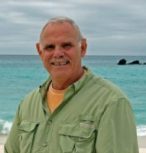DNA reveals the past and future of coral reefs
New DNA techniques are being used to understand how coral reacted to the end of the last ice age in order to better predict how they will cope with current changes to the climate. James Cook Univer

From 2005 to 2022, the main node of the ARC Centre of Excellence for Coral Reef Studies was headquartered at James Cook University in Townsville, Queensland (Australia)








Abstract: Strategic communication is purposeful and aimed at concrete outcomes. Being able to envision the pathways through which those outcomes can plausibly result is a distinct advantage. In this informal seminar, Prof Ham will talk with us about his thematic approach to communication and what he calls “making a difference on purpose.” We have much to learn about the causal effects of communication on human cognition and behavior. But we know quite enough to do better than chance alone. Armed with a substantiated model of communication influence, environmental communicators can significantly increase their odds of making a difference on purpose.
Biography: Sam H Ham is Professor Emeritus of communication psychology and international conservation in the University of Idaho’s Department of Conservation Social Sciences. Sam’s research has focused on the role of interpretation in parks, protected areas and sustainable tourism destinations and in applying communication theory to heritage and nature‐based tour guiding, travellers’ philanthropy, and other free‐choice learning settings. In the past 10 years, his research on the strategic use of interpretation to influence visitor behaviour has led to significant advances in protected area management across the globe. Sam has authored two of the world’s leading texts on applied interpretation, including his newest book, Interpretation—A Guide for Making a Difference on Purpose and the worldwide best‐seller, Environmental Interpretation—A Practical Guide for People with Big Ideas and Small Budgets, which was published in four languages. He also has authored nearly 400 other publications and has presented in excess of 50 keynote addresses at professional conferences and symposia. Sam’s training in applied communication has reached more than 50,000 people across the United States, Australia, and in 47 other countries. He is the recipient of numerous national and international awards for his teaching and training, including the NAI Fellow Award, University of Idaho’s Excellence in Outreach Award, and the University of Idaho’s Excellence in Teaching Award, the highest honour bestowed by the university on one of its own faculty members. In 2007, he was honoured by Clemson University with the William C. Everhart Award for his lifetime contributions to environmental and heritage interpretation across the world.
New DNA techniques are being used to understand how coral reacted to the end of the last ice age in order to better predict how they will cope with current changes to the climate. James Cook Univer
A new study on the effects of climate change in five tropical countries has found fisheries are in more trouble than agriculture, and poor people are in the most danger. Distinguished Profess
James Cook University researchers have found brightly coloured fish are becoming increasingly rare as coral declines, with the phenomenon likely to get worse in the future. Christopher Hemingson, a
Researchers working with stakeholders in the Great Barrier Reef region have come up with ideas on how groups responsible for looking after the reef can operate more effectively when the next bleaching
Abstract: As marine species adapt to climate change, their heat tolerance will likely be under strong selection. Individual variation in heat tolerance and its heritability underpin the potential fo
Abstract: The Reef Ecology Lab in KAUST’s Red Sea Research Center explores many aspects of movement ecology of marine organisms, ranging from adult migrations to intergenerational larval dispersal
Abstract: Macroalgal meadows are a prominent, yet often maligned component of the tropical seascape. Our work at Ningaloo reef in WA demonstrate that canopy forming macroalgae provide habitat for ad
Abstract: Sharks are generally perceived as strong and fearsome animals. With fossils dating back at least 420 million years, sharks are not only majestic top predators but they also outlived dinosa
Abstract: Connectivity plays a vital role in many ecosystems through its effects on fundamental ecological and evolutionary processes. Its consequences for populations and metapopulations have been
Abstract: Evolution of many eukaryotic organisms is affected by interactions with microbes. Microbial symbioses can ultimately reflect host’s diet, habitat range, and even body shape. However, how
Abstract: The past few years have seen unprecedented coral bleaching and mortality on the Great Barrier Reef (GBR) but the consequences of this on biodiversity are not yet known. This talk will expl